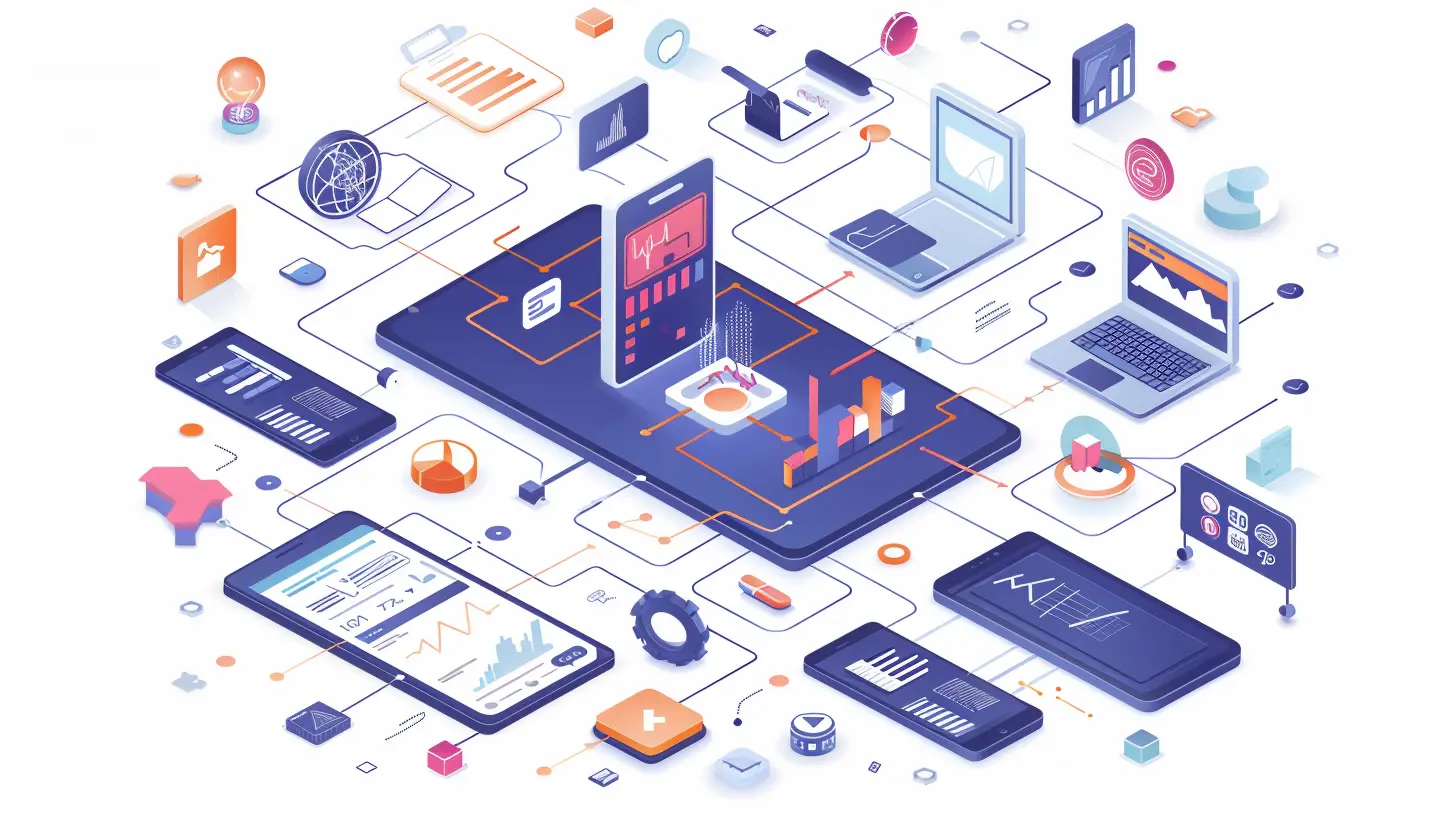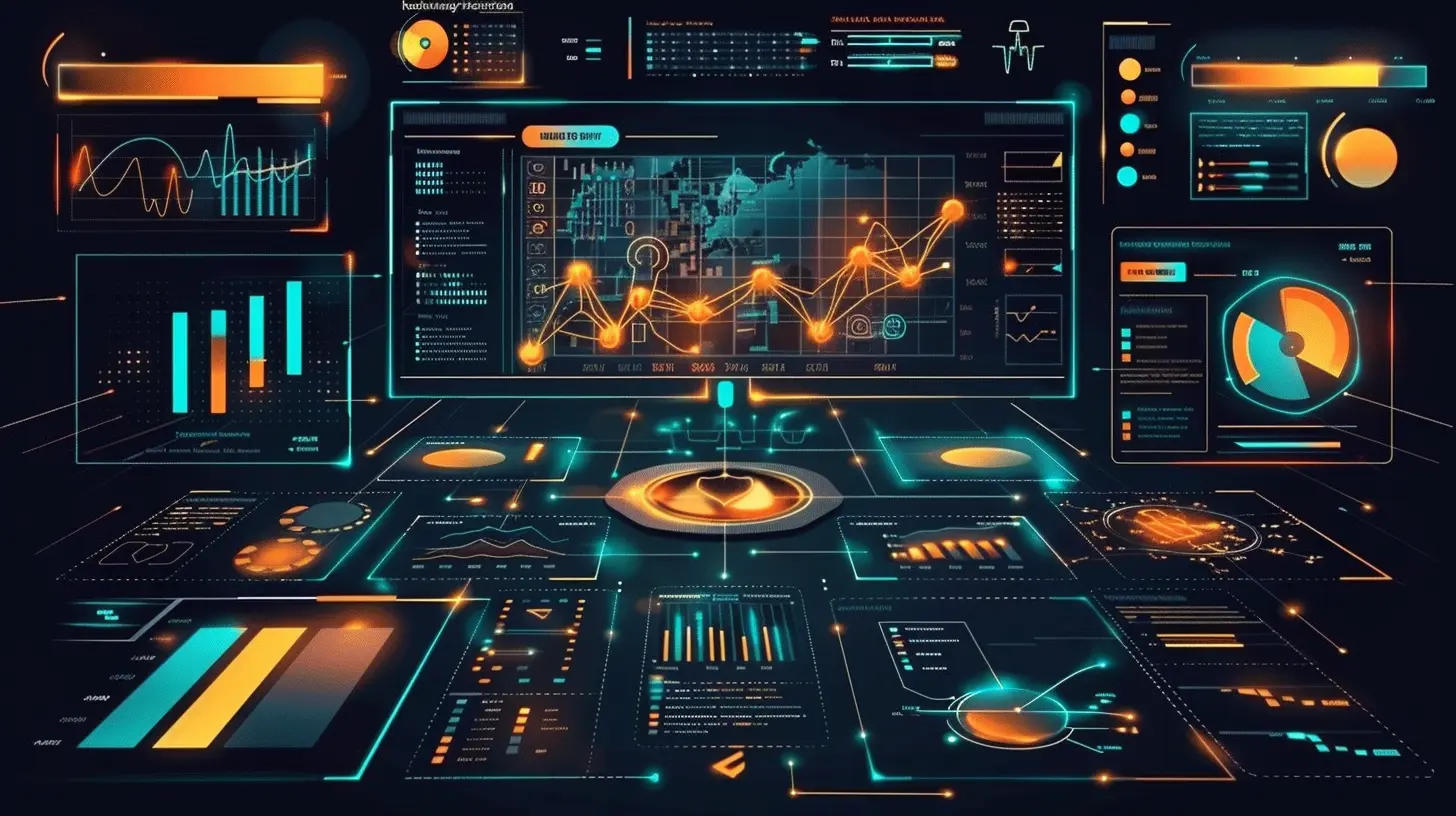How Big Data is Revolutionizing Healthcare Analytics
16 March 2025
In today's tech-driven world, data has become the new currency, and no industry is exempt from its influence. But if there’s one sector where the power of data is making massive waves, it’s healthcare. With the rise of big data, healthcare analytics is experiencing a revolution that’s transforming everything from patient care to operational efficiency. Whether it's predicting patient outcomes, streamlining hospital operations, or advancing medical research, big data is changing the game. But how exactly is big data driving this transformation in healthcare analytics? Let's dive in!

What is Big Data?
Before we get into the nitty-gritty, let's first understand what we mean by "big data." Big data refers to vast sets of structured and unstructured data that are too complex for traditional data-processing software to handle. Imagine the sheer volume of data generated by hospitals, wearable devices, electronic health records (EHRs), lab results, and even social media posts. Yeah, it’s a lot! Big data isn't just about the size; it’s also about how fast this data is generated and the diversity of the data sources.In healthcare, that could mean everything from patient histories and medical images to genome sequences and real-time monitoring from wearable devices. All of this creates a massive pool of information that, when analyzed effectively, can reveal patterns, trends, and insights that were previously impossible to detect.

The Importance of Healthcare Analytics
So, why does healthcare need analytics? Think about it: the healthcare industry is sitting on a goldmine of data, but without proper tools to analyze it, that data is essentially useless. Healthcare analytics involves applying statistical techniques, machine learning algorithms, and predictive models to this data in order to make informed decisions.Types of Healthcare Analytics
Healthcare analytics comes in various forms, and each serves a specific purpose. Let's break them down:1. Descriptive Analytics: This is the most basic form of analytics. It answers the question, "What happened?" Descriptive analytics is used to summarize historical data, like the number of patients treated or the average length of hospital stays.
2. Predictive Analytics: As the name suggests, predictive analytics is all about forecasting future outcomes. By analyzing past data and identifying patterns, healthcare providers can predict things like patient readmission risks or disease outbreaks.
3. Prescriptive Analytics: This is where things get really exciting. Prescriptive analytics not only predicts outcomes but also suggests actions to take. For instance, it might recommend specific treatments or interventions to improve patient outcomes.
4. Cognitive Analytics: Cognitive analytics is the bleeding edge, leveraging AI and machine learning to mimic human thought processes. It can analyze unstructured data like medical notes or imaging reports to provide deeper insights.
How Big Data is Revolutionizing Healthcare Analytics
Now that we’ve got the basics down, let’s talk about how big data is shaking things up in the healthcare world.1. Personalized Medicine
Remember when medical treatment was a one-size-fits-all approach? Not anymore! Thanks to big data, healthcare is moving towards personalized medicine, which tailors treatments to individual patients based on their unique genetic makeup, lifestyle, and history.For example, big data analytics can analyze genomic data to predict how a patient will respond to specific drugs. This means doctors can prescribe medications that are more likely to work and avoid those that could cause harmful side effects. It's like having a crystal ball for medicine—only, instead of magic, it's powered by data.
With the aid of predictive analytics models, healthcare providers can also identify patients at risk of developing chronic diseases like diabetes or heart disease. If a patient’s health data indicates that they’re at risk, interventions can be made early on, possibly preventing the disease altogether. This proactive approach is a game-changer in healthcare.
2. Improved Patient Outcomes
Big data is helping healthcare providers improve patient outcomes in numerous ways. One of the most significant developments is real-time monitoring. Wearable devices like smartwatches and fitness trackers collect real-time data on things like heart rate, physical activity, and sleep patterns. This data can be fed into analytics platforms, where it’s used to monitor patients and detect any abnormalities.For instance, if a patient's heart rate spikes or drops suddenly, healthcare providers can be alerted in real-time, allowing them to intervene before the condition worsens. This kind of continuous monitoring ensures that patients receive timely care, which can be the difference between life and death in some cases.
3. Operational Efficiency
Hospitals and clinics are complex ecosystems, and managing them efficiently is no small feat. That’s where big data comes in. By analyzing operational data—such as patient wait times, staff allocation, and resource usage—healthcare institutions can optimize their workflows and reduce inefficiencies.For example, predictive analytics can forecast patient admission rates, allowing hospitals to better manage their resources. If a hospital knows that flu season will result in a surge of patients, they can allocate more staff and resources accordingly, avoiding bottlenecks and improving the overall patient experience.
Additionally, big data analytics can help reduce hospital readmissions, which is a key metric for healthcare quality. By analyzing patient data, hospitals can identify at-risk patients and implement preventive measures to ensure they don’t need to return for further treatment.
4. Cost Reduction
Healthcare is expensive—there’s no denying that. But big data is playing a role in reducing healthcare costs without compromising quality. How? By optimizing resources, reducing hospital readmissions, and improving the accuracy of diagnoses and treatments, big data analytics helps healthcare institutions cut down on unnecessary expenses.For instance, through predictive analytics, hospitals can identify which patients are likely to need more intensive care, helping them allocate resources more efficiently. Similarly, big data can identify patterns in treatment plans that are more cost-effective without compromising patient care.
5. Enhanced Drug Development
Drug development is a lengthy, costly process, but big data is speeding things up. Traditionally, developing a new drug could take years of clinical trials and testing, but with big data, pharmaceutical companies can accelerate the process.By analyzing data from previous trials, researchers can identify potential drugs that are more likely to succeed. Additionally, AI algorithms can simulate the effects of drugs on virtual patients, reducing the need for lengthy trials. This not only speeds up drug discovery but also makes it more affordable.
Moreover, big data analytics can be used to monitor the safety and effectiveness of drugs once they’re on the market. By analyzing real-world data from patients taking the drug, pharmaceutical companies can quickly detect any adverse effects and make necessary adjustments.
Challenges of Big Data in Healthcare
Of course, no discussion about big data would be complete without addressing the challenges. While big data holds incredible promise, it’s not without its hurdles.1. Data Privacy and Security
Healthcare data is incredibly sensitive, and with the rise of big data comes the risk of breaches and data theft. Protecting patient data is paramount, and healthcare institutions must ensure that they’re complying with regulations like HIPAA (in the US) to safeguard this information.2. Data Integration
One of the biggest challenges in healthcare is integrating data from various sources. EHRs, lab results, wearable devices, and even social media all generate valuable data, but getting these systems to “talk” to each other is no easy task.3. Data Quality
Not all data is created equal. In healthcare, inaccurate or incomplete data can lead to wrong conclusions, which in turn can result in poor patient care. Ensuring that the data being analyzed is accurate, complete, and up-to-date is critical to the success of any big data initiative.The Future of Big Data in Healthcare Analytics
So, what does the future hold for big data in healthcare? Simply put: the possibilities are endless. As technology continues to evolve, we can expect even more advanced analytics techniques, including AI and machine learning, to play a bigger role in healthcare.In the future, we might see hospitals relying on AI-driven systems to diagnose patients, recommend treatments, and even perform surgeries. Big data will continue to drive personalized medicine, making healthcare more tailored, efficient, and effective. And, as more data becomes available, the insights we gain will only become more powerful.
Conclusion
Big data is revolutionizing healthcare analytics by unlocking new ways to improve patient care, optimize operations, and reduce costs. From personalized medicine to real-time patient monitoring, the healthcare industry is harnessing the power of data to make informed decisions and deliver better outcomes. While challenges like data privacy and integration remain, the potential for big data to transform healthcare is undeniable. As we move forward, big data will undoubtedly play an even bigger role in shaping the future of healthcare.all images in this post were generated using AI tools
Category:
Big DataAuthor:

John Peterson
Discussion
rate this article
14 comments
Levi McGovern
Great insights! Big Data is truly transforming healthcare for better patient outcomes.
April 7, 2025 at 10:35 AM

John Peterson
Thank you! I'm glad you found the insights valuable. Big Data's impact on healthcare is indeed profound!
Elara Potter
This article expertly highlights the transformative role of big data in healthcare analytics. By enabling personalized treatment plans, predictive modeling, and improved patient outcomes, big data not only enhances clinical decision-making but also drives operational efficiencies. A pivotal shift that promises to reshape the healthcare landscape significantly.
April 7, 2025 at 5:00 AM

John Peterson
Thank you for your insightful comment! I'm glad you found the article emphasizes the transformative impact of big data on healthcare analytics. Your thoughts on personalized treatment and operational efficiencies are spot on!
Skyler Larsen
Big Data is not just a trend; it's the lifeblood of modern healthcare. By harnessing vast datasets, we're unlocking insights that drive patient outcomes, streamline operations, and personalize treatment. It's time for the industry to embrace this transformation unapologetically—because better data means better health for everyone.
April 5, 2025 at 8:38 PM

John Peterson
Absolutely! Big Data is indeed essential in healthcare, enhancing patient care and operational efficiency. Embracing this tech is crucial for a healthier future.
Kristy Kirk
Exciting possibilities! How can big data enhance patient care and outcomes?
April 3, 2025 at 8:41 PM

John Peterson
Big data enhances patient care by enabling personalized treatment plans, predicting health trends, and improving decision-making through data-driven insights, ultimately leading to better outcomes.
Desiree Henderson
Embracing big data in healthcare is a game-changer! It's empowering us to make smarter decisions, improve patient outcomes, and transform lives. The future of health is bright and data-driven!
April 2, 2025 at 1:02 PM

John Peterson
Thank you! Absolutely, big data is pivotal in enhancing decision-making and patient care in healthcare, paving the way for a more informed and effective future.
Kira Thomas
Data's potential redefines patient care; insights shape healthier futures.
March 30, 2025 at 3:34 AM

John Peterson
Thank you! I completely agree—data-driven insights are crucial for improving patient outcomes and transforming healthcare.
Damian McMillan
Great article! It’s fascinating to see how big data is transforming healthcare analytics. The potential for improved patient outcomes and personalized treatments is exciting. Can’t wait to see how these advancements continue to shape the future of medicine!
March 28, 2025 at 8:47 PM

John Peterson
Thank you! I'm glad you enjoyed the article. The advancements in big data truly hold incredible promise for the future of healthcare.
Elowen Hurst
Fascinating insights! I'm intrigued by how big data is shaping predictive analytics in healthcare. What specific technologies or algorithms are driving these changes, and how do they ensure patient privacy while delivering such powerful insights? Excited to see how this evolves!
March 26, 2025 at 11:35 AM

John Peterson
Thank you! Key technologies include machine learning algorithms and natural language processing, which analyze vast datasets for predictive insights. To ensure patient privacy, techniques like data anonymization and secure multi-party computation are employed, allowing powerful analytics while safeguarding sensitive information. Exciting times ahead!
Zarek Wilson
Big Data is not just enhancing healthcare analytics; it’s fundamentally transforming patient outcomes and efficiency.
March 26, 2025 at 3:57 AM

John Peterson
Absolutely! Big Data is a game changer in healthcare, driving impactful improvements in patient outcomes and operational efficiency.
Oberon McLanahan
Great article! It's fascinating to see how big data is transforming healthcare analytics. The ability to harness vast amounts of information for personalized treatment and predictive insights is truly revolutionary. I’m excited to see how these advancements will improve patient care and outcomes in the coming years!
March 25, 2025 at 1:54 PM

John Peterson
Thank you! I'm glad you found it interesting. The potential of big data in healthcare is indeed exciting and promises to greatly enhance patient care.
Zareth Simon
Big Data enhances healthcare analytics by improving patient outcomes, enabling predictive insights, and fostering personalized treatment, ultimately transforming the healthcare landscape.
March 25, 2025 at 4:13 AM

John Peterson
Thank you for your insightful comment! Indeed, big data is a game changer in healthcare, driving better patient care and tailored treatments through powerful analytics.
Violet McInnes
Big data is transforming healthcare analytics by enabling precise patient insights and tailored treatments. With real-time data processing, providers can enhance decision-making and optimize resource allocation. However, privacy concerns and data management challenges must be addressed to fully harness its potential. The future looks promising!
March 23, 2025 at 7:22 PM

John Peterson
Thank you for your insightful comment! You've highlighted key benefits and challenges of big data in healthcare perfectly. Addressing privacy and data management will indeed be crucial for maximizing its potential.
Tala McMichael
Big Data is transforming healthcare analytics by enabling personalized treatments, predictive insights, and improved patient outcomes dramatically.
March 22, 2025 at 7:19 PM

John Peterson
Absolutely! Big Data is indeed revolutionizing healthcare by tailoring treatments and enhancing predictive capabilities, leading to significantly better patient outcomes.
Nathan Vaughn
Big Data transforms healthcare by enhancing patient outcomes, streamlining operations, and enabling personalized treatments through powerful analytics and insights.
March 21, 2025 at 9:16 PM

John Peterson
Thank you for your insightful comment! Indeed, big data's role in improving patient care and operational efficiency is pivotal in the healthcare transformation.
MORE POSTS

Virtual Reality Beyond Gaming: New Applications on the Horizon

The Environmental Impact of Fintech: How Tech Can Drive Sustainable Finance

How Smart Earbuds Are Changing the Way We Listen to Music

The Evolution of Data Governance in the Big Data World

Smart Fitness Equipment: Which Gadgets Will Help You Meet Your Goals?

The Role of Fintech in Bridging the Gender Financial Inclusion Gap

Testing the Best Drones for Aerial Photography and Fun

The Role of Blockchain in Securing Autonomous Vehicle Networks

Reviewing the Best Standing Desks for A Healthier Workspace